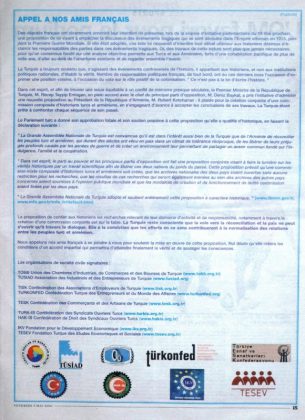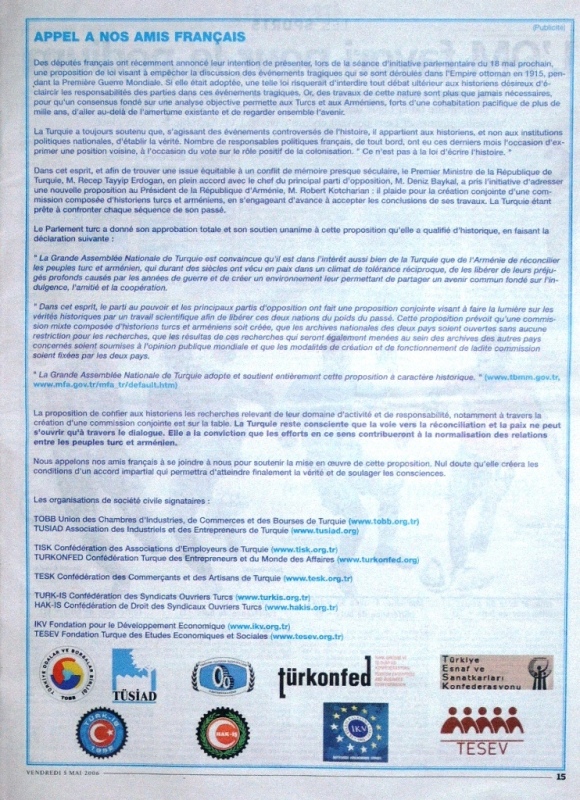
 Left side: Jean Eckian from
Left side: Jean Eckian from
On 18th May 2006 the French Parliament will vote a bill that makes the denial of the Armenian Genocide a punishable crime.
Media articles are analyzing this new development, especially
Following are three articles (from Turkish, European and Canadian Perspectives) on the same subject:
Article of ?Zaman? daily Turkish online newspaper
10th May 2006
By Salih Boztas, Ali Ihsan Aydin,
The Turkish administration briefly recalled its Ambassador to France this week, Osman Koruturk, who returned to
?
Prime Minister Recep Tayyip Erdogan, meeting with business leaders partnered with French companies yesterday, asked for their support to obstruct the submission of the motion to the French Parliament on May 18.
?
Business executives representing French economic interests in
?
The motion, proposed by the main opposition Socialist Party in
?
The legislative proposal brings a fine of 45,000 Euros and a prison sentence to those who deny the so-called Armenian genocide. Trade unions, labor unions and non-governmental organizations in
?
As part of the concerted efforts, the Turkish Parliament Foreign Affairs Commission went to
Turkish Parliamentary Foreign Affairs Commission Chairman Mehmet Dulger from the ruling Justice and Development Party (AKP), and deputies Musa Sivacioglu, Onur Oymen and Gulsun Bilgehan Toker will meet with representatives of political parties present at the French Parliament and ask for the motion to be withdrawn.
?
The Turkish deputies are expected to warn the French politician that the motions' becoming law may lead to irreparable damages in bilateral relations.
?
Erdogan: 10 days of hard work await
In the frame of economic efforts,
?
The Prime Minister had a 45-minute meeting with the executives of French companies operating in
?
Twenty-two of 28 companies joined the meeting. TEB-BNP CEO Yavuz Canevi, one of the participants, said: “We all agree with the Prime Minister. We have not reached decisions like an embargo yet,” and Omnium Plastic Industry Chairman Bulent Akman warned, “There will be much reaction if the motion passes. It will cause trouble both for the French and us.”
Article of EUobserver.com (an independent website published by EUobserver.com ASBL, an non-profit association registered under Belgian law).
9th May 2006
By Teresa K?chler
A spokesperson for the foreign ministry in
Later this month French parliamentarians are set to discuss and vote on a law that would make denial of the so-called Armenian genocide a crime.
The law would mirror existing French legislation against holocaust-denial, carrying a sentence of up to five years' prison and a ?45,000 fine.
“The adoption of these texts will provoke irreparable damage to Franco-Turkish relations,” a Turkish government spokesperson said, according to French media.
Brussels MEPs, acting on a French initiative late last year, also demanded that
The European Commission's translation database, IATE, defines genocide as “harmful acts…committed with intent to destroy, in whole or in part, a national, ethnical, racial or religious group.”
A commission official told EUobserver that
Trade sanctions mooted
The head of the Turkish parliament's foreign affairs commission, Mehmet Dulger, said this weekend that Turks could boycott French products and French firms could lose lucrative contracts if the legislation is passed, according to Reuters.
“
He added that he would lead a group of Turkish lawmakers to
In 2001,
Turkish lawmakers are also preparing a rival law accusing
The legal proposal has also come under fire from less politicised voices, with Turkish and French intellectuals protesting over the “inflation of laws of memory” and criticising the government's “promulgation of official truths.”
Meanwhile, an open letter to “our French friends” signed by nine groups of Turkish entrepreneurs and trade unions, published in several French daily newspapers, said “it is not up to the law to describe history.”
“We are too small to have enemies,” an Armenian diplomat said.
Article of CBC News Online,
9th May 2006
A diplomatic war about genocide
By John Gray
(John Gray has worked for a number of Canadian newspapers, including most recently more than 20 years with the Globe and Mail, where he served as Ottawa bureau chief, national editor, foreign editor, foreign correspondent and national correspondent).
On the distant matter of
The Liberal government of the day, like every government for decades before, was trying to duck a decision on the question. As Parliament debated the issue and the minority government wriggled like a worm on a hook, Graham said plaintively, “We'd like our Armenian friends and our Turkish friends to put these issues in the past.”
?
In other words, please don't make us take sides. Let's just all be friends together. How forlorn! How Canadian!
But almost a century after that terrible slaughter, there remains an uncomfortable immediacy. The Turkish government has just recalled its ambassadors to
In
Does it matter what you call mass slaughter?
In
The Turkish government said the recall of the ambassadors would be for only a short time, yet there could still be serious economic repercussions.
Of the two countries, it is
“This is an issue that we will raise during the negotiation process,” Barnier said. “We will have about 10 years to do so and the Turks will have about 10 years to ponder their answer.”
Putting pressure on
There is a temptation to believe that a dispute about a word is really not much more than a dispute about a word, and that both countries have locked themselves into a position from which they cannot extricate themselves with any dignity.
Everyone agrees that there was a terrible slaughter; what is at issue is the magnitude of the slaughter and the name to apply to it.
The Turks acknowledge that perhaps 300,000 Armenians, as well as many Turks, died as a result of civil disturbances involving the Christian Armenians, who had always lived in
The Armenians say that as a result of a deliberate campaign of genocide, 1.5 million men, women and children were killed or starved to death, and thousands of others were deported.
Historians tend to side with the Armenians. There have even been a few Turkish historians who have called on their fellow citizens to consider the Armenian case, but those are isolated voices in a defiant land.
The
It was Barnier, the former French foreign minister, who cast the dispute in a much broader perspective. The parallel he drew was that of the reconciliation of
“If, as I think, the core idea of Europe's project is that all its members should reconcile one with another ? like France and Germany, which have put reconciliation at the centre of their project ? and that each member state should reconcile with its own past, then I believe that when the time comes Turkey, too, will have to come to terms with its own past and history, and recognize this tragedy.”
Scan of the French newspaper sample by Jean Eckian.
